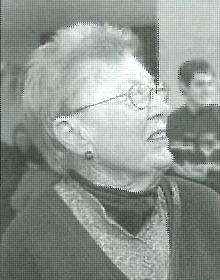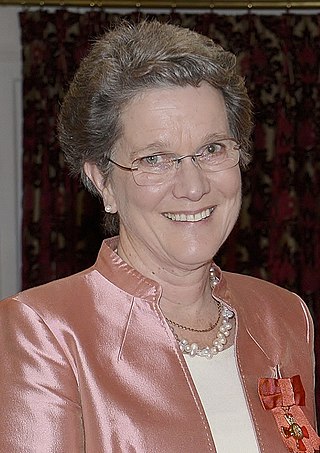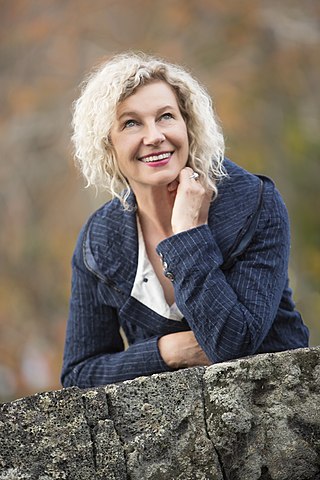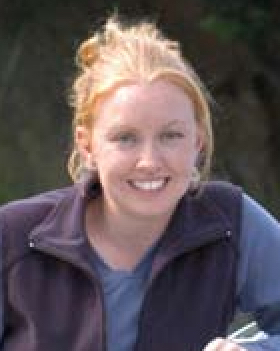
Kaimanawa horses are a population of feral horses in New Zealand that are descended from domestic horses released in the 19th and 20th centuries. They are known for their hardiness and quiet temperament. The New Zealand government strictly controls the population to protect the habitat in which they live, which includes several endangered species of plants. The varying heritage gives the breed a wide range of heights, body patterns and colours. They are usually well-muscled, sure-footed and tough.
John Warham was an Australian and New Zealand photographer and ornithologist notable for his research on seabirds, especially petrels.

Jacqueline Sara Rowarth is a New Zealand agronomist and science administrator.

Dame Carolyn Waugh Burns is a New Zealand ecologist specialising in lakes. She is an emeritus professor at the University of Otago.

Brian Peter John Molloy was a New Zealand plant ecologist, conservationist, and rugby union player.
Susan Mary Wakefield was a New Zealand tax expert. She was also noted for her interest in art and her philanthropy, establishing Ravenscar House Museum in Christchurch with her second husband, Jim Wakefield.

Elsie Gertrude "Paddy" Bassett was a New Zealand agricultural scientist. She graduated from Massey Agricultural College in 1941, becoming the first woman graduate from that institution. Bassett was also one of the first two women students accepted into Canterbury Agricultural College.

Nicola Mary Shadbolt is a New Zealand farmer, academic and company director. She is currently a full professor at the Massey University and Chair of Plant & Food Research.

Dianne Heather Brunton is a New Zealand ecologist, and head of the Institute of Natural and Computational Sciences at Massey University. Her research area is the behaviour and cultural evolution of animal communication, especially bird song in southern hemisphere species such as the New Zealand bellbird.
Walter Clive Clark was a New Zealand zoologist who specialised in the study of nematodes and pycnogonids. He was a professor at Massey University and later the University of Canterbury.

Giselle Margaret Byrnes is a New Zealand historian. She is the provost and assistant Vice-Chancellor of Massey University, New Zealand. Previous employment included the Waitangi Tribunal and as lecturer at Victoria University of Wellington.
Suzanne Georgina Pitama is a New Zealand academic, is Māori, of Ngāti Kahungunu and Ngāti Whare descent and as of 2020 is a full professor at the University of Otago in Christchurch, New Zealand.
Jennifer Bohun Hay is a New Zealand linguist who specialises in sociolinguistics, laboratory phonology, and the history of New Zealand English. As of 2020 she is a full professor at the University of Canterbury.

Roseanna Bourke is a New Zealand academic and registered educational psychologist. As of 2019 she is a full professor at Massey University.
Barbara Louise Chilvers is a New Zealand marine biologist who researches marine mammals. She is Professor of Wildlife Ecology in the School of Veterinary Science at Massey University and Director of Wildbase Oiled Wildlife Response at the university.

Carol Anne Wham is a New Zealand scientist and professor of public health nutrition at Massey University.

Karen Ann Stockin is a New Zealand academic marine ecologist, and as of 2021 is a full professor at Massey University. Her research focuses on animal welfare and the impacts of human activities on cetacean populations, including tourism effects, and persistent marine contaminants.

Priscilla M. Wehi is a New Zealand ethnobiologist and conservation biologist. As at July 2021 she is an associate professor at the University of Otago and on the first of that month officially undertook the role of director of Te Pūnaha Matatini, a centre of research excellence in complex systems and data analytics. During the COVID-19 pandemic in New Zealand Te Pūnaha Matatini scientists have developed mathematical models of the spread of the virus across the country that influence the New Zealand government's response to the outbreak. In 2021 Wehi was awarded the Hill Tinsley Medal.

Mary Davidson Earle was a Scottish-born New Zealand food technologist. She was the first female faculty member of a university engineering department in New Zealand when she joined Massey University's food technology department in 1965.

Patricia M. Fraser is a New Zealand soil scientist at Crown Research Institute Plant & Food Research in Lincoln. Her work focuses on the role of earthworms in the soil, and nitrate leaching, to further understand soil quality in cropping systems. She won a 2020 New Zealand Woman of Influence Award in the Rural category.













